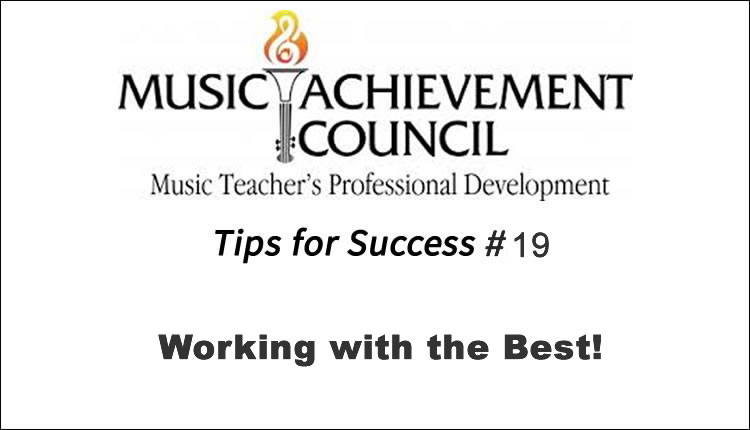Supporting Music Education:
Work with the Best!
Teaching is a people business. Identifying and hiring the best-prepared and motivated candidates for a position is the most important thing we can do for our students, our programs and ourselves. A thorough hiring process, one that reflects the care and concern you and your administration have for your program, is to everyone’s benefit.
What You Can Do—Get Involved!
Express an interest in participating in the hiring process.
Be familiar with your district’s policies and practices. They will guide all steps in the hiring process. You may or may not be able to be involved directly in hiring. At the very least, you can be an advocate for your district’s music programs by spreading the word about vacancies and encouraging quality candidates to apply.
A key component of successful programs is that they are based on a team concept where student talents are developed sequentially through K–12 articulation. This only happens in an environment of effective, ongoing communication among staff and administration.
Recruiting
The ideal situation is one where the district is looking for outstanding candidates on a regular basis. Recruitment is an area where you can have great influence. Spread the word. Personal contacts are critical!
Request that the district advertise openings in local and regional papers as well as in professional journals.
Post the vacancy on state e-mail bulletin boards. A number of Internet sites also post vacancies.
Send letters to college placement offices to ensure applications from recent graduates and experienced alumni.
Network with colleagues and through your professional organizations. Contact college music education departments and officers of your state
music organizations.
Take advantage of bulletin boards or forms to post vacancies at state and national conventions.
Screening the Applications
Your recruiting has generated a stack of résumés and applications. Now what? The résumé is a succinct record of skills and accomplishments. You are searching for past experiences that are good indicators of future success.
Recent college graduate résumés will have a different look than those from experienced professionals. Key indicators include leadership positions held, activities in service organizations (musical/non-musical) and involvement in department/campus organizations. Grades, music awards and individual achievements are important, but the best prospective teachers often have a background rich in people-oriented activities. The experienced teacher’s résumé will include additional schooling and a listing of recent responsibilities, accomplishments and recognitions.
Different is not necessarily bad. You may find you are drawn to candidates who can do more than one thing. They are often the most talented and offer you the greatest flexibility for the future.
The ideal screening session would have two or more people sorting the applications into individual “Yes,” “No” and “Maybe” piles. They would then compare results and discuss differences until reaching a consensus.
It is again important to bring the element of personal contact into the process. At best, screening is an imprecise art prone to unfortunate oversights. A phone call to a colleague can help you see a résumé in an entirely different light. This is also the time when a phone call to a reference or colleague can save you considerable time and effort. Thoroughly checking references before extending the invitation to interview can give you a
good feeling for whether or not the person is right for the position.
Interviewing
Often, candidates for teaching positions in music are in- terviewed and selected by principals or other administra- tors who possess a limited background in music. If that is your situation, share Choose to Teach Music with your principal. These materials can help your principal ask bet- ter questions and hopefully make a more informed deci- sion. It might also get him or her thinking about including you in the process!
A comprehensive interview should always include performance assessment in addition to the standard
interview questions. The performance assessment should include performing on major instruments, demonstrating piano keyboard skills, conducting and singing. Performance in specialty areas such as guitar for classroom music, or woodwind, brass, percussion or strings for instrumental positions could be included. Often, a truer picture of a candidate’s strengths and weaknesses is learned in a few minutes of performance than from an hour of questions and answers.
Portfolios have long been a staple in the visual arts and are becoming a more common requirement among all disciplines. Many recent graduates will have developed portfolios as part of their senior year requirements. These offer excellent insight into a student’s or experienced professional’s skills, achievements, creativity and work habits.
The Final Test
The top candidate is usually selected after a series of interviews and offered the position. Stop! Can this candidate be successful working with your students in your district? The best way to find the answer is by asking him or her to conduct a rehearsal or teach a class. While there are never any guarantees, this is the most critical part of the process to ensure that you have found the right person. Do whatever it takes to make this happen. Recruit a group of students to serve as a summer interview ensemble, promise pizza or offer one of your classes for the demonstration lesson.
In most cases, a candidate’s performance will only affirm your beliefs. However, a significant number of candidates are great in the interview and stumble when actually in the classroom. Time invested now may save you and your administrator days of frustration in the future. Ideally, all candidates would be given this opportunity. Then, you would also be in a better position to find that teacher who has weak interview skills but is superb when working with students.
Want more tips for keeping music strong in your schools? Visit the site devoted to all things music advocacy: www.supportmusic.com


